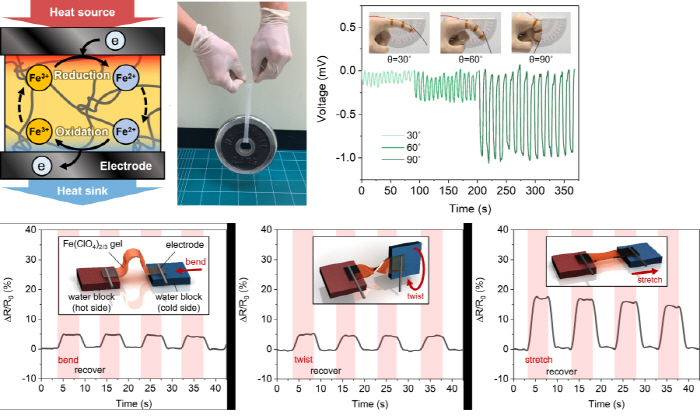Developing artificial skin that produces electricity with body temperature...Smart healthcare and military sensors are expected to be used
Mar 31, 2025
|
Professor Kang Tae-joon of the Department of Mechanical Engineering developed a self-developed artificial skin using semi-solid thermoelectric electrolytes while conducting joint research with Incheon National University and the Korea Institute of Science and Technology.
Recently, as one of the technologies for converting thermal energy into electricity, liquid thermal cell technology using temperature sensitivity of oxidation and reduction reactions is attracting attention. However, liquid electrolytes are easy to flow down or evaporate, making it difficult to use for a long time and less durable.
To solve this problem, the research team developed a gel-like hard and flexible 'hydrogel electrolyte' and produced artificial skin that enables power generation using body temperature and operation of wearable devices.
The newly developed hydrogel consists of a polymer that attracts water well and a polymer that keeps the structure strong. A wide range of elastic modulus can be adjusted according to the mixing ratio of the two polymers.
The research team optimized the mixing ratio of the two polymers to create a hydrogel with the same elasticity as human skin and high strength. It is a biocompatible material that is safe even if it comes into direct contact with the body, and has properties suitable for use in artificial skin or wearable devices.
It was also found that if a thermoelectric electrolyte that converts heat into electricity permeates the hydrogel developed by the research team, it can produce high power of 1.1 mW/㎡·K2.
The research team explained that when using hydrogel as an artificial skin sensor, it generated electricity by itself without external power supply by using the difference between body temperature and external temperature. It proved that a person who detects human movement can be used as a self-driving sensor.
In recognition of its excellent research achievements, the research results were recently selected and published as a cover paper in the international renowned academic journal 'Advanced Functional Materials (IF=18.5)'.
Kang Tae-joon, a professor of mechanical engineering at Inha University, said, `This study has secured a source of artificial skin technology that allows wearable devices to operate continuously without external power sources.' It is expected to be applied to various fields such as smart healthcare and military sensors.'
Meanwhile, the study was conducted with the support of the Korea Research Foundation, the National Institute of Animal Science of the Rural Development Administration, and the Korea Electronics and Telecommunications Research Institute.
|
This article was translated by Naver AI translator.















